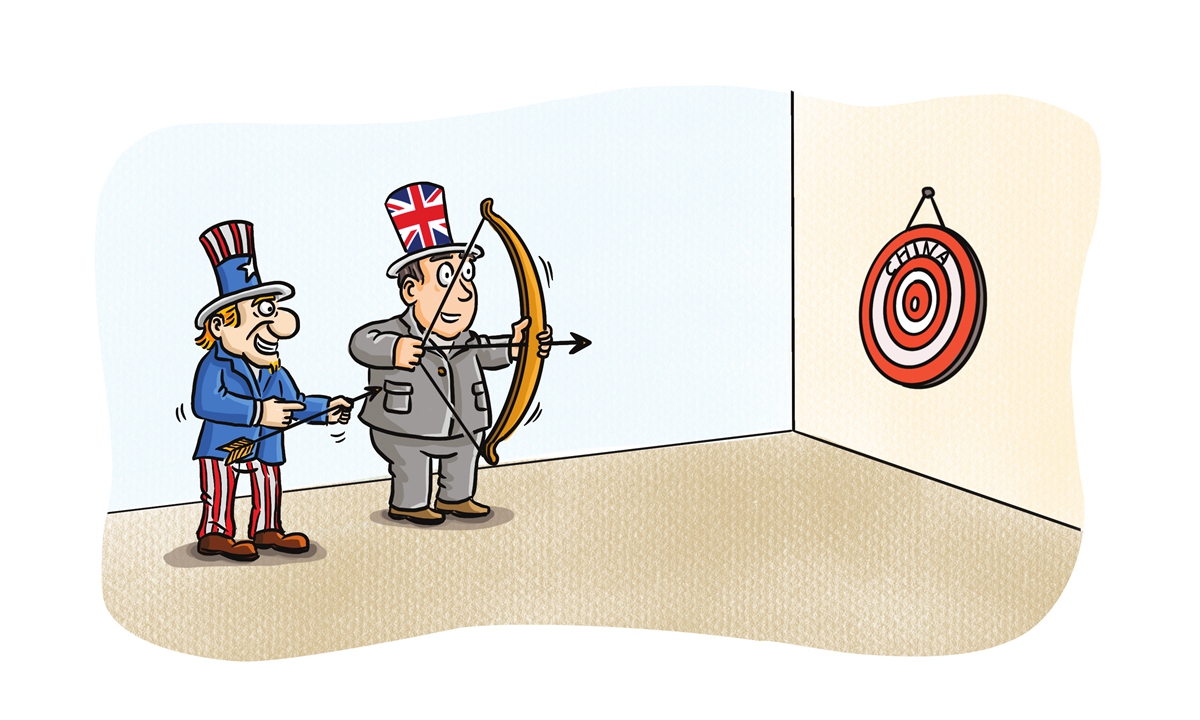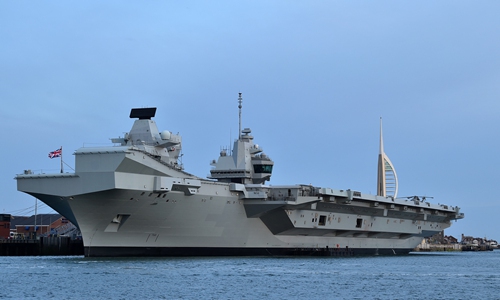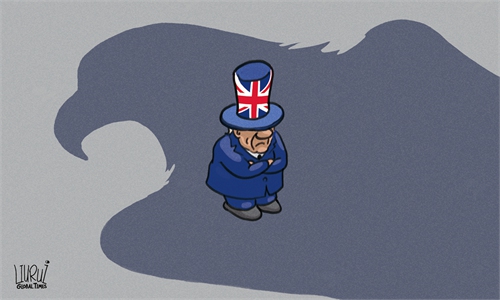
Illustration: Xia Qing/GT
The Queen Elizabeth carrier strike group is making its way into the South China Sea with some ships already there ahead of carrier HMS Queen Elizabeth, according to the United States Naval Institute (USNI) News on Monday.The UK carrier strike group started its maiden operation deployment in May, and it is set to visit 40 countries including India, Japan, South Korea and Singapore in a deployment covering 26,000 nautical miles, according to a report from the Royal Navy, the UK's naval force. The British government sees the fleet as a potent symbol of "Global Britain."
By hitting out in various directions, the UK's intention is obvious. It wants to provoke China, engage in the so-called freedom of navigation like the US does and demonstrate its military presence in the Asia-Pacific region. Britain is still living in its colonial days.
The Royal Navy, which emerged from the Age of Discovery, has gradually declined. Now, the UK intends to use its navy to revive its old dream of an empire, but its overall strength cannot support such global ambitions.
"Currently, five of the Royal Navy's Type 45 destroyers are unavailable for deployment, leaving just one warship in the class capable of operating, which is the HMS Defender," Chinese military expert and commentator Song Zhongping told the Global Times on Monday. "The decline is evident."
While Britain is trying to show off its strength, its own problems are acute. On July 14, a COVID-19 outbreak was reported on the HMS Queen Elizabeth and around 100 cases were confirmed, according to the BBC. Besides, the UK's economy has fallen into recession and about one-fifth of UK pensioners are living in poverty, according to an analysis of government figures in June. This being the case, the UK still insists on following the US to provoke China, which is a big mistake.
"If the UK wants to set an entire carrier strike group in the Asia-Pacific region, it just shows that the UK's national security is not threatened by any country at all. This carrier strike group is worthless. It is built for nothing but to coordinate with the US," Song said.
The UK is unwilling to face other countries' progress and its own decline. It is still living in the "auld lang syne," trying to show its strength to the world through the so-called freedom of navigation. The Royal Navy destroyer HMS Defender's Black Sea mission suffered setbacks from Russia, and Russian President Vladimir Putin said the Russian navy can detect any enemy and launch an "unpreventable strike" if needed.
"Likewise, if the UK wants to provoke the Chinese People's Liberation Army in the South China Sea, it will inevitably lead to strong countermeasures from China. An old saying in China goes that if you want to punish someone, you need to consider saving face for his big brother," Song said. "However, what China will do is just the opposite: China will make it clear to the US that London will be punished by acting like Washington's running dog in provoking Beijing."
Britain wants to revive its past glory, but it has been heading in the wrong direction. Putting a limited budget into messing up the Asia-Pacific situation is very likely to drag the recovery of the UK's economy in the post-pandemic era. After all, permanently deploying two warships in Asian waters will be like a bottomless pit for the UK. It will affect the British people's living standards as well.
Coordinating with the US in disrupting the Asia-Pacific situation will only dwarf the UK's own national image, and weaken the attractiveness of the UK's global strategy.
Under such circumstances, Britain will only drift further away from its dream of rebuilding itself as a great global power.


